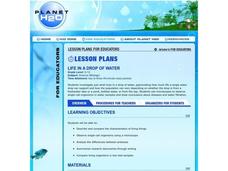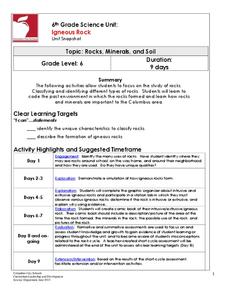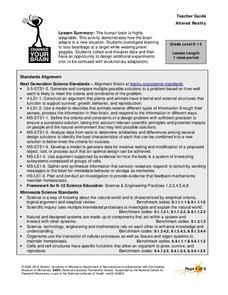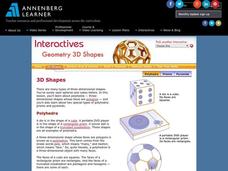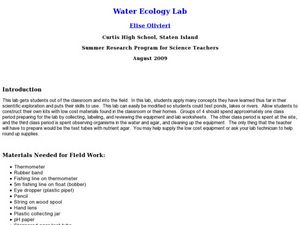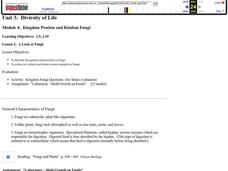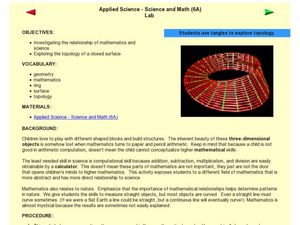Curated OER
Testing for Life
Students test for organic molecules to determine if a solution contains once living molecules. For this characteristics of life lesson, students test common liquids for the presence of organic molecules, including starch, protein, and...
Serendip
Is Yeast Alive?
Through two investigations, life science learners determine whether or not yeast is alive. They perform tests for metabolism by providing sugar and observing if gas is produced as a byproduct. They incubate some of the sample for at...
Curated OER
Life Cycle - Human Biology
In this life cycle worksheet, 9th graders complete 3 different procedures that distinguish viruses and bacteria and inherited characteristics. First, they read the background excerpt given about bacteria and viruses. Then, students cut...
Curated OER
Life in a Drop of Water
Students examine the structure, function, and characteristics of microscopic organisms that inhabit freshwater through collection of water samples and observation through microscopes.
Curated OER
Field Trip - Marine Science Institute
Students discover the ocean life of the San Francisco Bay. In this ocean lesson, students take a Discovery Voyage of the Bay ecosystem through the Marine Science Institute. Also available are inland voyages, ocean labs, and tidepool...
Curated OER
Life Cycle of the Drosophila Fly
Pupils observe the life cycle of the Drosophila fly as well as manipulate large numbers of flies, determine the difference between the sexes, and identify the different stages of the fly's life cycle.
Pace University
Grade 6-8 Living Things
What characterizes a living thing? Scholars explore the concept during a differentiated instruction unit on living things. They perform lab experiments to determine how animals adapt to stimuli, watch videos and learn about...
Curated OER
The Origin of Life
In this origin of life worksheet, students write answers to five questions. They describe characteristics of the first life forms and how scientists believe oxygen accumulated in the Earth's atmosphere.
Biology Junction
Arthropods
Even the creepy crawlers have pretty amazing anatomy! A thorough lesson describes characteristics of arthropods with an emphasis on their structures. Beginning with a review of the taxonomy hierarchy, the lesson explains the different...
Curated OER
Human Evolution: Biology, Bones
Learners will love a weeks worth of bone study. They use bones and characteristics of bones to explore the evolution of hominoids. Bones are compared, categorized, and considered. A great way to bring physical anthropology and material...
Curated OER
Bug's Eye View
Investigate the life of bugs and how they interact with the environment in this integrated science and language arts instructional activity. Young scientists construct mini environments in cages in order to make observations. This data...
Columbus City Schools
Igneous Rock
These rocks are HOT! Well, they used to be, anyway. Take young geologists on a two-week journey through the life and times of the average igneous rock. Lab groups work together to hypothesize about intrusive and extrusive igneous rock...
Curated OER
What Do We Mean by "Living Things"?
Students discuss the characteristics of life. In this living things lesson students complete a lab while working in groups. Students examine different organisms and create a poster to present to the class.
Curated OER
Comparing Mitosis with Meiosis
Life science learners view an online animated mini textbook comparing two types of cell division. Working in groups, they use a digital microscope to capture images of cells in different stages of mitosis and meiosis. Then they create an...
University of Minnesota
Altered Reality
Fascinate young life scientists by showing them how their brain learns. By using prism goggles while attempting to toss bean bags at a target, lab partners change their outlook on the world around them, producing amusing results....
Annenberg Foundation
Geometry 3D Shapes: 3D Shapes
Explore vocabulary related to three-dimensional shapes. An instructional website describes the characteristics of different geometric solids. Learners can use an interactive component to view nets, faces, vertices, and edges of common...
Purdue University
Reptiles, Amphibians, and the Scientific Method
What do a reptile and an amphibian have in common? A three-part lesson allows scholars to investigate the similarities and differences between the two types of animals by identifying specific body parts. The lesson highlights the...
Curated OER
Meet the Plants
Students examine the difference between living and non-living things. In this living versus non-living lesson, students complete a KWL worksheet and a Living and Non-Living Chart. They examine a variety of plants and non-plants before...
Curated OER
Comparing Sea Horses and Knights
Students investigate sea horses and knights. In this marine biology lesson, students read the book How to Hide an Octopus and discuss the purpose of camoflage. Students research knights and sea horses and record their research on their...
Sea World
Marine Animal Husbandry and Training
Step into the role of a zoo director with several activities about animal training and running a zoo. Kids calculate the amount of food each animal needs, design a habitat for penguins, decide how to breed bottlenose dolphins, and train...
Curated OER
Flour Beetles
Pupils observe life stages in flour beetles and graph the results. They write a summary report.
Curated OER
Water Ecology Lab
Learners determine the characteristics of a stream ecosystem and its organisms. In this water ecology lesson students complete several labs that shows them presence of life, water appearance, and water flow.
Curated OER
Diversity of Life
Students study fungi and its characteristics. In this fungi lesson students collect and observe fungi then answer questions on what they saw.
Curated OER
Applied Science-Science and Math Lab
Students explore magnification. In this scientific observation skills lesson, students observe sea life items and draw pictures of what they observe. Students predict which lens will have the strongest magnification when given three...





